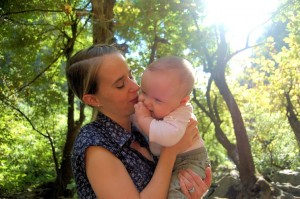
“Mom! Look at me!” Learning To Focus On My Child’s Face
 For the past few months, I’ve noticed that my almost four-year-old daughter, Miss A, has a floating eye. It usually only happens when she’s tired or so into a story—where expressive hand motions abound—that she has trouble focusing on my face.
For the past few months, I’ve noticed that my almost four-year-old daughter, Miss A, has a floating eye. It usually only happens when she’s tired or so into a story—where expressive hand motions abound—that she has trouble focusing on my face.
Both of my siblings had vision trouble at some point, and I started needing glasses around seventeen, so when my mom came out to Wisconsin to help me with the girls over hunting season, she suggested that I should get my daughter’s eyes checked, just in case.
So this past week, we bundled up and went to the eye doctor. I stayed in the waiting room with our sixteen-month-old, Miss M, while my husband held Miss A during her appointment. An hour later, however, this helicopter mom needed to know what was going on.
Therefore, when Miss M heard her sister’s voice, I let her run. I followed her into the room—oops!—where the optometrist was finishing up and proceeded to ask him the same questions he had already answered in detail.
He told me our daughter has 20/20 vision, and that her floating eye should correct itself over time.
“Is there anything we can do to help?” I asked.
He said that I can help her do what are essentially eye pushups, strengthening the one weaker muscle wrapping the eye, helping to pull it back in. All I have to do is hold a pencil or a light and help her focus on it, moving it slowly toward her face.
My author friend, Amy Hill Hearth, shared an article this week, “The Eight-Second Attention Span,” which discussed the shocking reality that Americans have shorter attention spans than goldfish.
I, for one, was not very pleased with this revelation.
After I read the article, I began to pay better attention to my attention span. I actually turned from the dishes and looked when my eldest daughter said, “Mom! Look at me!” Yes, she was peering through the plastic container lids that I keep in the bottom drawer next to the stove. But still . . .
It made a difference. I began doing “eye pushups,” so to speak, forcing myself to focus on what really matters and not on the things that—years from now—could very well become obsolete.
One of the most encouraging things the optometrist said that day was this: “Children are not born knowing how to focus; they learn how to do it over time.”
Furthermore, the article in The New York Times said that adults can strengthen their focusing skills by gardening and reading. I would also like to add that we can strengthen our focusing skills by setting aside computers or smart phones and staring at our beloved children’s faces.
If babies can learn how to focus their vision, I assume we adults can, too.
How are you going to focus your vision this week?


